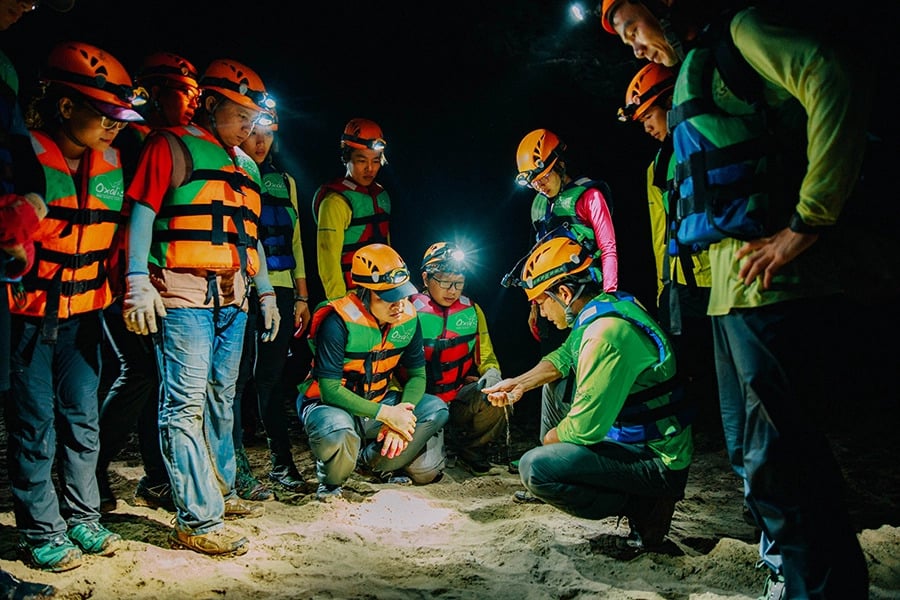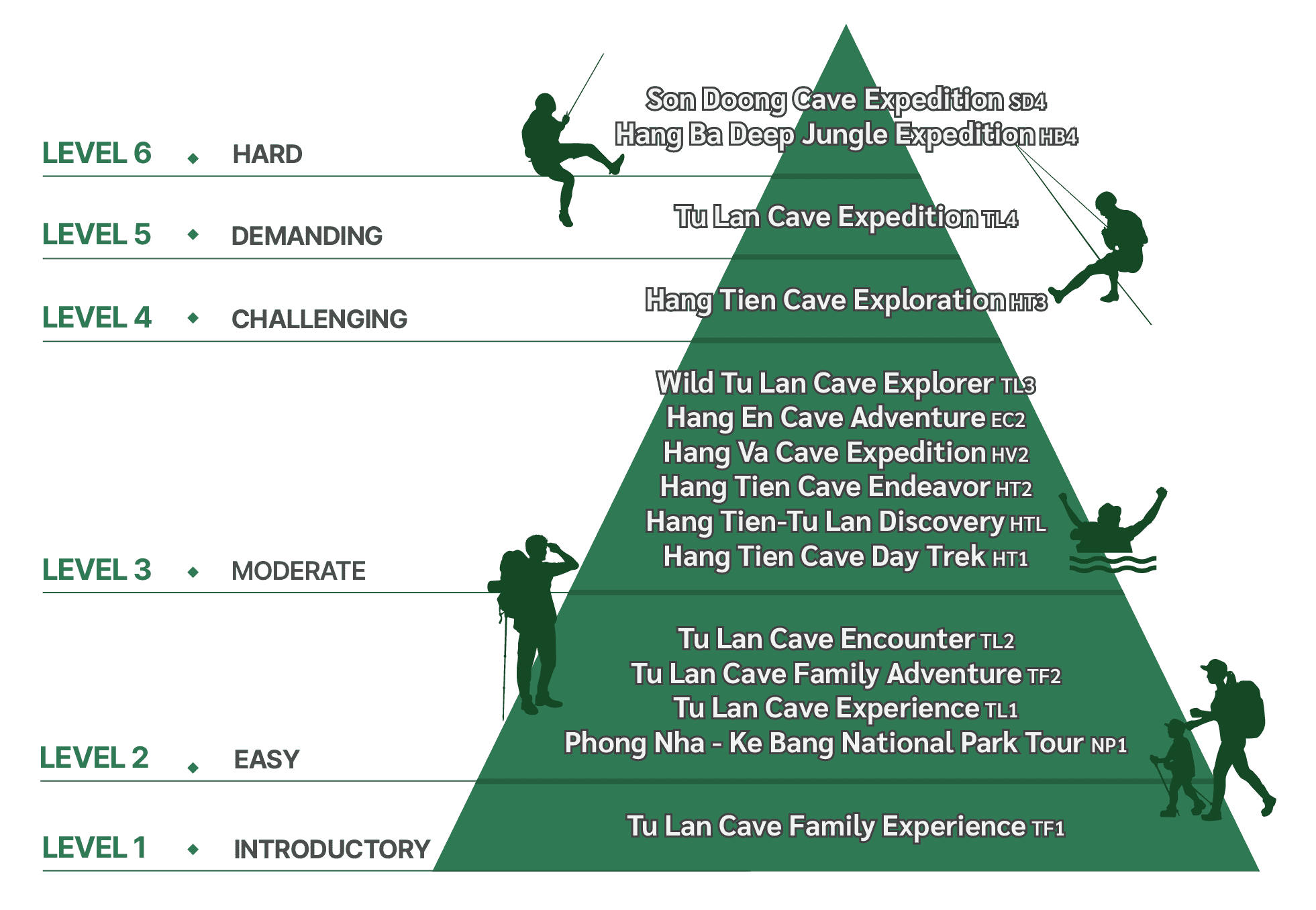

Oxalis Adventure has run tours into the caves in and around Phong Nha for the last 10 years. During that time, we have had no dangerous episodes caused by water or flooding. The reasons for this are as follows:
Oxalis has developed an internal Adventure Level system that can help guests to assess the suitability of each tour for them. These levels are based on several years of collecting information from guests, cave experts and Oxalis management staff. If you are still not sure about your ability, please talk to one of our Adventure Consultants to seek more advice. More detailed descriptions of each tour can be found in the ‘Which Tour?’ section.
Requires: Spirit of adventure
Expect: Easy trails, some rocky sections, optional swim

Requires: Basic fitness, some sports activities
Expect: Easy trails, some rocky sections, short ladder climb & optional swim

Requires: Regular physical activities or sports
Expect: Rocky terrain, steep hills, long trek and short ladder climb

Requires: Regular physical activities or sports
Expect: Rocky terrain, long trek or technical rope work

Requires: Good level of fitness, previous trekking experience
Expect: Rocky terrain, some technical sections, steep hills, long treks, swims

Requires: Good level of fitness; previous trekking experience
Expect: Multiple river crossings, extensive rocky terrain, and multiple technical sections.

Oxalis Adventure currently employs 26 adventure guides and 78 safety assistants. Together they are responsible for safety during all Oxalis Adventure tours. The safety requirements for each tour are implemented by the Technical and Operations Directors and the Technical Training Officer, who also ensure that the guides and safety assistants have received the necessary training.
| Level | Description |
|---|---|
| Trainee Guide | Prospective guides are selected from recently graduated applicants and will have a 2 month assessment period, before receiving a contract as a training guide if suitable. |
| Training Guide |
A training guide will follow a 6-month training programme, including theory and practice of all first aid and safety techniques. They will also learn how to run the tour, deliver the safety briefing and pass on knowledge to the guests. This will include assisting the senior guide on tour and leading level 1 tours under supervision. After an in depth appraisal and assessments by the Technical and Operations Directors and the Technical Training Officer they may be promoted to the Junior Guide level. |
| Junior Guide | Will lead Level 1 & 2 single day tours, and work as a second guide on multi day and level 3 tours. |
| Experienced Guide | Will start by leading all level 1-3 tours. Receive training and assessment to progress to level 4-5 tours, after minimum 6 month’s experience. After a further 6 month’s training and assessment will lead level 6 with cave expert. |
| Senior Guide | Will need to show good leadership and problem solving skills to reach this level. Will be involved with guide training and managing guide teams for Team Building and filming groups. |
| Safety Assistant | All safety assistants will be competent in the use of life lining, safety harnesses, river crossing, and assisting guests over difficult terrain etc. After training and assessment they will assist with the abseil and flying fox. |
Adventure guides and safety assistants follow the company training program, including theoretical and practical training that are regularly assessed and updated. Oxalis has a well-established training program and training is recorded and monitored. During off season (from mid-September to mid-November each year), further training is conducted, including first aid, technical safety (such as cave rescue and river rescue) and other tour related skills.
Every month the Technical Training Officer Mr Martin Holroyd develops a training program to train all guides and safety assistants according to their level.
Take a look at the training photos and videos below:
Since we started running tours, we have always provided filtered drinking water at all times. Currently we use filters from Watts Water Technologies, a US Company. We use a series of 4 filters, including a sediment filter and carbon filter. All staff know that if they are sick, they should not go on tour.
Liquid hand sanitiser is always provided and campsites have soap and water hand washing stations. Staff who prepare meals are fully trained in hygiene standards; avoiding cross contamination with raw and cooked food; using gloves to handle food; washing cooking and eating items with soap and water and sterilising with boiling water etc.
Oxalis has always made sustainable tourism and environmental protection a cornerstone of their business.
To practice sustainable tourism of course we have to protect nature and the environment. We have a strict policy when passing through the caves and the jungle. We use gas for cooking, biodegradable plastic bags where necessary, compost all waste and bring all rubbish out of the jungle. Guests are provided with reusable bottles for drinking water and we use rechargeable batteries for all lights.
We keep our group numbers small, and limit the number of tours per day, to reduce the impact on the caves and environment. All tours follow a designated path in the jungle and the cave. Cutting of any vegetation on the footpaths is only to ensure the safety of people using the paths.
All our staff are trained to protect the caves and the jungle. We always explain to our guests why there are restrictions on their activities. Our guides are trained in geology, cave formation and local culture to better inform our guests.
For our work to be truly sustainable we also need to engage with the local community. As well as employing many local people, we also have the Oxalis Foundation which supports charitable aims. These include grants to poor children to help them go to school; building a school library; building floating houses for flood prone areas; building septic toilets; swimming lessons for local children. By working with the local people we hope we can give them work opportunities which do not impact on the environment; educate them to improve their living standards and health; help them to see appropriate tourism as a benefit.